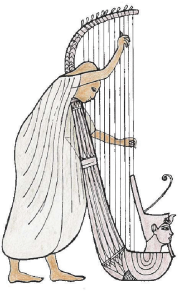 Today, in some remote villages throughout the world, there still exists the tradition of the bard – the story teller, the singer of songs.
Today, in some remote villages throughout the world, there still exists the tradition of the bard – the story teller, the singer of songs.
Much of our literature, and a great deal of what we know, has reached us from remote times through this oral tradition. The Iliad and The Odyssey came to us through the bard we know as Homer.
World In Tune presents material in the spirit of the bard. It’s relative and personal. A child can relate to it because it consists of the the myths, stories, art, architecture, history and music which are truly part of his past. Our children have a rich tradition – it’s global and their rightful inheritance. We need only to tell them about it.
Music is our storyteller. Music, having the dual aspects of sounding mathematics and of the art which touches the heart, becomes a bridge whereby children can travel from the intellectual world of facts and figures to the more playful world of song, dance and theater. In this way the child has time to assimilate and relate what he is learning to himself. He plays instruments which are similar to those played 4000-5000 years ago. In doing so, he or she experience the importance of the coordination of the body, which rhythm demands, comes in contact with the emotional aspects of sound and the intellectual reason for its being. Here within the scope of the child’s experience, this hands-on approach begins to awaken an interest not only in music, but in literature, art, science and the history of his ancestors. 
Our children have a treasure waiting for them, an inheritance which is rightfully theirs. World In Tune maps out where treasures are to be found. It points the direction but leaves the mystery for the child to discover in his own time and in his own way. The time has come not only to admire great monuments from the past, but to point out that the spirit and creativeness which produced these works of art live within our children today – only waiting to be tapped.
